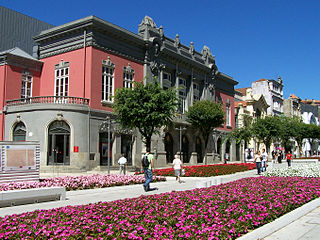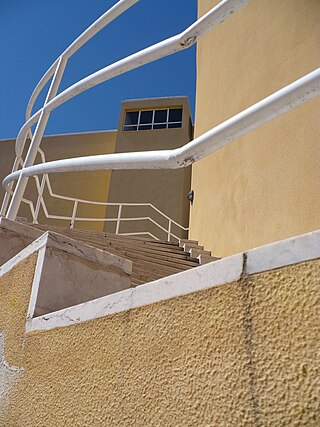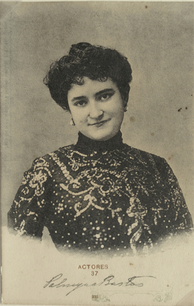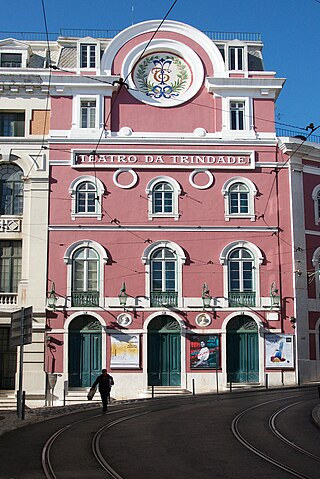
The Teatro Massimo Vittorio Emanuele is an opera house and opera company located on the Piazza Verdi in Palermo, Sicily. It was dedicated to King Victor Emanuel II. It is the biggest in Italy, and one of the largest of Europe, renowned for its perfect acoustics.

The Theatre Circo is a 20th-century, Portuguese revivalist theatre, in the civil parish of São João do Souto, municipality of Braga. Designed by the architect João de Moura Coutinho, it was first inaugurated on 21 April 1915 with a performance of Ruggero Leoncavallo's operetta La reginetta delle rose.

The Diogo Bernardes Theatre is a theatre in the civil parish of Arca e Ponte de Lima, in the municipality of Ponte de Lima, in the Portuguese district of Viana do Castelo.

Luís Filipe Valente Lá Féria Orta, known professionally as Filipe La Féria, is a Portuguese director, producer, and screenwriter for television and theatre.
Alfredo Costa was an Italian operatic baritone who had an active international career from 1900 until his death in 1913 at the age of 39. He appeared in French and Italian language operas of the 19th century and early 20th century, performing throughout the Italian provinces, and in Brazil, Chile, France, Portugal, Ukraine, and the United States. His voice is preserved on recordings made for Pathé Records in 1908, and for Odeon Records and the Gath & Chaves department store in Buenos Aires.

The Lisbon Theatre and Film School of the Polytechnic Institute of Lisbon inherited the function of the National Conservatoire, founded by Almeida Garrett, in 1836, and of teaching Film, introduced in the same establishment since 1971. The main goal of the Lisbon Theatre and Film School is training in the fields of Theatre and Cinema. Sometimes it is still referred to by its former designation "Conservatório Nacional". It is a public institution of higher education created in Lisbon but now located in Amadora, Portugal.

Regina Isabel Luisa Pacini Quintero was a Portuguese lyric soprano, and First Lady of Argentina as the wife of Marcelo Torcuato de Alvear.

Laura Alves was a Portuguese actress on stage, film and radio.

Palmira Bastos (1875–1967) was one of the best-known Portuguese stage actresses in the first half of the 20th century.

The Teatro da Trindade is a theatre in the Chiado neighbourhood of Lisbon, Portugal, built in the 19th century. It is one of the oldest theatres in Lisbon still in operation.

The Teatro São Luiz is a theatre located in the Chiado district of the Portuguese capital of Lisbon. It opened on 22 May 1894.

The Teatro da Rua dos Condes, or simply Condes, was a theatre in the Portuguese capital of Lisbon. It was opened in 1738 and rebuilt in 1755 after an earthquake. Never considered comfortable, it was demolished and rebuilt in 1888 and eventually converted to a cinema. After a further demolition and reconstruction as a purpose-built cinema, the building now houses a Hard Rock Café. For part of its life the Teatro da Rua dos Condes was one of Lisbon's major theatres, attracting the city's elite, including the royal family. However, with the construction of newer, more modern theatres it gradually moved from offering operas and legitimate theater to vaudeville and revues with more of a mass appeal.

The Teatro do Ginásio was a theatre in Lisbon, Portugal that mainly concentrated on performances of comedy shows.

Lucília Simões was a Brazilian-born Portuguese actress, stage director and impresario.

Emília de Oliveira (1874–1968) was a Portuguese theatre and film actress.

Sofia Santos was a Portuguese actress.

Jesuína Saraiva (1865–1947) was a popular Portuguese actress and wife of the famous actor Chaby Pinheiro.

Maria do Céu Águeda Camacho de Sena Faria de Vasconcelos ComIH, better known as Águeda Sena, was a distinguished Portuguese ballet dancer and choreographer.

Ana Elisa Pereira was a Portuguese stage and film actress and singer, mainly known for her work in theatres in Lisbon.



















